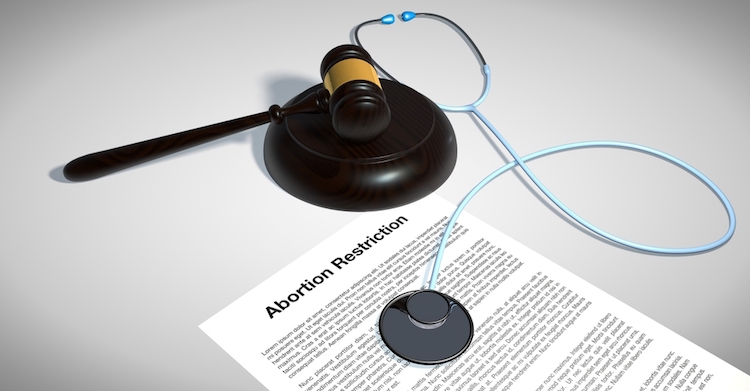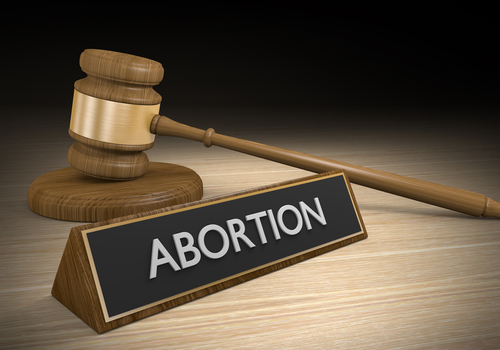Supreme Court appears ready to allow abortion providers' challenge to Texas abortion law

Images from Shutterstock.
A U.S. Supreme Court majority appeared ready Monday to allow abortion providers to challenge the Texas abortion law that bans abortions at about six weeks of pregnancy.
Conservative Justices Amy Coney Barrett and Brett M. Kavanaugh seemed swayed by arguments that the law improperly blocked federal judicial review of a constitutional issue, the Washington Post reports. They had previously voted with the court’s three most conservative justices Sept. 1 to let the law take effect.
According to the New York Times, a majority of the justices seemed inclined to allow the challenge by abortion providers but maybe not the suit by the federal government.
Chief Justice John G. Roberts Jr. called the federal government’s challenge “as broad as can be,” CNN reports.
Reuters, the Associated Press and Bloomberg Law (here and here) also have coverage.
The Texas law relies on the general public, rather than the state, for enforcement. It authorizes lawsuits by private parties who may seek $10,000 in damages against anyone who aids an abortion. That enforcement mechanism doesn’t involve state executive branch officials who would usually be sued in a constitutional challenge.
Abortion providers instead sued defendants that include judges who would hear the suits for damages and law clerks who would docket the cases.
 Related article from ABAJournal.com: “ABA urges Supreme Court to rule US can sue to block unconstitutional Texas abortion law”
Related article from ABAJournal.com: “ABA urges Supreme Court to rule US can sue to block unconstitutional Texas abortion law”
Texas has argued that the law can be challenged in state court when a litigant seeking $10,000 files suit. But a ruling against the plaintiff wouldn’t set precedent unless the plaintiff appeals, the New York Times points out.
During the arguments, Roberts noted the Constitution allows federal courts to hear cases and controversies. But a judge may agree with abortion providers, which would mean that he is not adverse to them and there is no controversy, Roberts said when addressing a lawyer with the Center for Reproductive Rights, Bloomberg Law reports.
The lawyer, Marc Hearron, later said it would be easier to say abortion providers are adverse to the clerks.
During his questioning, Kavanaugh suggested that the Texas approach could be used to threaten other federal rights, according to Bloomberg Law. He cited this hypothetical: A law allows anyone to sue a person who uses an AR-15 rifle for $1 million in damages.
Roberts also referred to a $1 million award in a hypothetical involving the abortion law, according to the New York Times.
“Assume that the bounty is not $10,000 but a million dollars,” Roberts said. “Do you think in that case the chill on the conduct at issue here would be sufficient to allow federal court review prior to the end of the state court process?”
The Supreme Court allowed the Texas abortion law to take effect Sept. 1 and again when it agreed to consider the standing issue on an expedited basis. Roberts had sided with the court’s three liberals in voting to block the law in September.
The court is considering two cases. One is a legal challenge by the U.S. Department of Justice, United States v. Texas, and the other is a legal challenge by abortion providers, Whole Woman’s Health v. Jackson.
See also:
ABAJournal.com: “Convicted ex-lawyer files bizarre suit against doctor under Texas abortion law”
ABAJournal.com: “DOJ explores ways to challenge Texas abortion law; judge grants TRO against anti-abortion group”
ABAJournal.com: “How could the DOJ counter Texas abortion restrictions? Law prof suggests prosecution”
ABAJournal.com: “SCOTUS formally rejects request to block Texas abortion ban”
ABAJournal.com: “Abortion providers ask Supreme Court to block Texas heartbeat law from taking effect”
ABAJournal.com: “Conservative SCOTUS justices question abortion decisions but delay action on Mississippi’s viability cert petition”
ABAJournal.com: “Supreme Court should uphold precedent in Mississippi abortion case, ABA amicus brief says”
Write a letter to the editor, share a story tip or update, or report an error.


